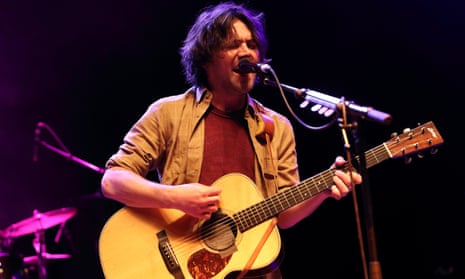Conor Oberst looks defeated. In the past three years, he’s fought false rape allegations, lost an older brother, battled a brain cyst – and watched Donald Trump become the US president. “It’s so fucking sad, it makes me wish for the days of George W Bush,” says the quivering voice and angry heart behind Bright Eyes’ Bush-baiting anthem When the President Talks to God. “I’m an emotional being.”
Actually, Oberst is more like an exposed nerve, his multitude of excesses – drink, drugs, sex – bound together by stunning anger, despair and self-recrimination. He’s been tearing open his heart and venting his spleen for public dissection since 1993 and, as well as serving a 16-year tenure in beloved indie band Bright Eyes, has released eight solo albums. Last year’s Ruminations was a set of startling demos featuring Oberst alone on piano, harmonica and acoustic guitar but, in March 2017, came “companion” piece Salutations and the songs were given the full-band treatment Oberst had always intended.
To create its lush, almost AOR Americana, Oberst enlisted the Felice Brothers and they feature in his live backing band, too. As the six-piece tear through the rollicking Get Well Cards, it’s obvious that arch loner Oberst has found a family. As his bile rises on Four Winds, he plays shoulder to shoulder with fiddle player Gregory Farley and goes head to head with talented guitarist Taylor Hollingsworth on the brilliant Train Under Water, before teasing his bandmates/“assholes” about living in “cushy” upstate New York and drawing on his own alcohol-imbued memories of the city in Till St Dymphna Kicks Us Out.
Recalling the first time Bright Eyes played this venue – “we were little spring chickens, we didn’t know what was going on” – Oberst plays a song from back then, 2000’s Something Vague. The audience cheer, but the smooth ease of Oberst’s current sound, along with song requests by noisy hecklers, mean the atmosphere never crackles with anticipation or unabashed delight.
So when, for the encore, he sits alone at a piano for a “newish” untitled song and sings: “Every motherfucker in this place tells me to sing shit,” it feels like a gig-saving salvo and, in wrenching magic from disappointment, utterly Oberst.
- At 02 Academy Liverpool, 21 August; 02 ABC Glasgow, 22 August. Box office: 0844-477 2000.

Comments (…)
Sign in or create your Guardian account to join the discussion